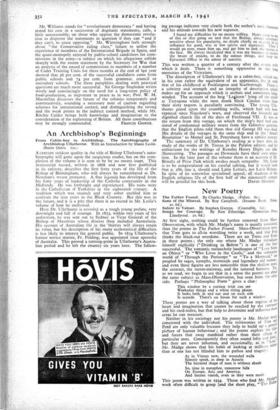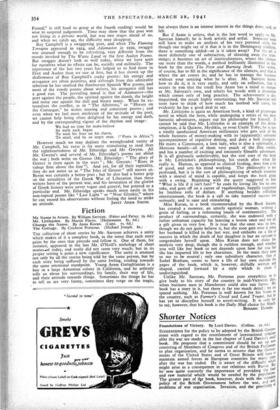New Poetry
The Father Found. By Charles Madge. (Faber. 6s.)
AT first sight, -nothing could be further removed from Mass- Observation, with which Mr. Madge's name is usually associated, than the poems in The Father Found. Mass-Observation notes that Tom goes to all-in wrestling twice a week, and that Fred thinks the black-out overdone. There are no Toms and Freds in these poems ; the only one where Mr. Madge introduces himself explicitly (" Drinking in Bolton ") is one of the least successful. The romantic melancholy landscapes of " Love Seeks an Object " or " Who Lives in the Castle," and the submarine world of " Through the Periscope " or " To a Mermaid," are peopled by sages, nymphs, mermaids and legendary old women; and even these figures are less noticeable than the shallow mere, the cataract, the turret-stairway, and the tattered banners. Yet, as we read, we begin to see that in a sense the, poems are about the same subject as Mass-Observation, but seen from the other side. Perhaps " Philosophic Poem " gives a clue:
This window by a curious trick can see Workaday things and a white rising planet. It looks both in and out and on each side Is outside. There's no house for such a window.
These, poems are a way of talking about those regions of the heart and imagination that cannot be reached by the canras0 and his card-index, but that help to determine and influence those areas he can measure. Neither in his sociology nor his poetry is Mr. Madge much concerned with the individual. The testimonies of Tom and Fred' are only—valuable because they help to build up a gew picture of Mullin behaviour • and the poems explore the tides and forces that sway mankind rather than their effects ica particular men. Consequently they often sound lofty and aim; but they are never inhuman, and occasionally, as in " Loss Mr. Madge shows that his habit of looking at millions ram° than at one has not blinded him to pathos and tragedy:
As in Vienna now, the wounded walls Silently speak, as deep in Austria The battered shape of man is without shade So, time in metaphor, tomorrow falls On Europe, Asia and America, And houses vanish, even as they were made.
acigeN This poem was written in 1934. Those who find Mr. 14-
work often difficult to grasp (and the short play, "The Father Found," is still hard to grasp at the fourth reading) would be wise to suspend judgement. Time may show that the poet was not living in a private world, but was two stages ahead of us, and when we catch up, the difficulty may disappear.
Roy Campbell is a swaggering poet, and when The Flaming Terrapin appeared in 1924, and Adamastor in 193o, swagger
was unusual enough to be refreshing, very different from the moods invoked by The Waste Land or the first Auden Poems. But swagger doesn't look so well today, when we have seen -for ourselves what its effects can be, socially and militarily. The experience of the last two years has helped us to find more in Eliot and Auden than we saw at first, but it has shown up the shallowness of Roy Campbell's cocky poems : his energy and arrogance are often pointless, and although from this admirable selection he has omitted the flamboyant Spanish War poems, and most of the rowdy poems about writers, his arrogance still has a good run. The prevailing mood is that of Adamastor—the poet against the people, the spirited against the dumb, the bright and noisy one against the dull and bleary many. When he ex- ternalises the conflict, as in " The Albatross," or " Horses on the Camargue," he writes moving and consistent poems ; and even when we feel most intolerant of the .attitude of the poet, we cannot help being often delighted by his energy and dash, and by the corresponding vigour of the rhythm and image:
We had no time for make-believe So early each began To wear his liver on his sleeve, To snarl, and be an angry man. (" Poets in Africa.") However much we may deplore the wrongheaded vanity of Mr. Campbell, his verse is far more stimulating to read than the rightheartedness of Mr. Etheridge and Mr. Gwynn. All Mr. Gwynn's and several of Mr. Etheridge's poems are about the war ; both write on Greece (Mr. Etheridge : " The glory of Greece is risen again in the wars " ; Mr. Gwynn: " Rises in valour firm above the fray "). And yet, for all their topicality, they do not move us as " The Isles of Greece " still moves us.- Byron was certainly a better poet; he also had a better grip on the actualities of the Greek ar of Liberation than these writers have of the present war, and his invocation of the glories of Greek history were never vague and general, but pointed to a particular end. Mr. Etheridge speaks much more easily in his non-topical poems like " Last Light " or " Near Glynhir," where he can record his observations without feeling the need to strike































 Previous page
Previous page